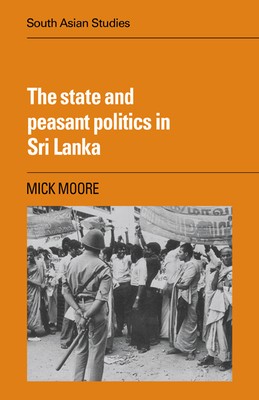
- We will send in 10–14 business days.
- Author: Mick Moore
- Publisher: Cambridge University Press
- ISBN-10: 0521047765
- ISBN-13: 9780521047760
- Format: 14 x 21.6 x 2 cm, minkšti viršeliai
- Language: English
- SAVE -10% with code: EXTRA
Reviews
Description
Dr Moore's enterprising book focuses on an apparent paradox: the failure of Sri Lanka's highly politicized smallholder electorate to place on the national political agenda issues relating to the public distribution of material resources. Sri Lanka has more than fifty years' history of pluralist democracy and such issues directly affect the interests of the smallholder population. Yet successive Sri Lankan governments have pursued economic policies favouring food consumers and the state itself at the expense of agricultural producers. In exploring the features of Sri Lanka's history, geography, politics and economy which explain this paradox, the author looks in detail at some of the dominant features of contemporary Sri Lanka: the political consequences of the plantation experience; the persistence of elite political leadership; and the causes and consequences of ethnic conflict.
EXTRA 10 % discount with code: EXTRA
The promotion ends in 22d.03:11:28
The discount code is valid when purchasing from 10 €. Discounts do not stack.
- Author: Mick Moore
- Publisher: Cambridge University Press
- ISBN-10: 0521047765
- ISBN-13: 9780521047760
- Format: 14 x 21.6 x 2 cm, minkšti viršeliai
- Language: English English
Dr Moore's enterprising book focuses on an apparent paradox: the failure of Sri Lanka's highly politicized smallholder electorate to place on the national political agenda issues relating to the public distribution of material resources. Sri Lanka has more than fifty years' history of pluralist democracy and such issues directly affect the interests of the smallholder population. Yet successive Sri Lankan governments have pursued economic policies favouring food consumers and the state itself at the expense of agricultural producers. In exploring the features of Sri Lanka's history, geography, politics and economy which explain this paradox, the author looks in detail at some of the dominant features of contemporary Sri Lanka: the political consequences of the plantation experience; the persistence of elite political leadership; and the causes and consequences of ethnic conflict.


Reviews